![]()
![]()
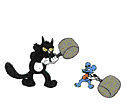
Issue #36
Disinfotainment Today
By Michael Dare

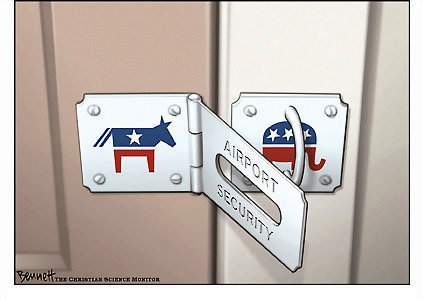
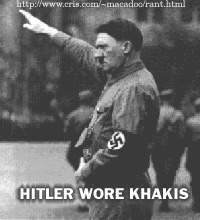
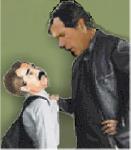

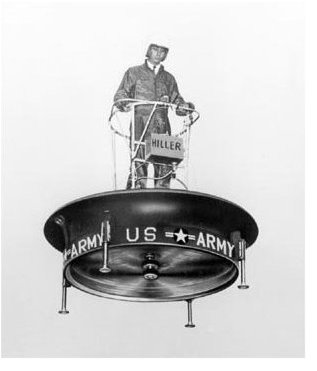
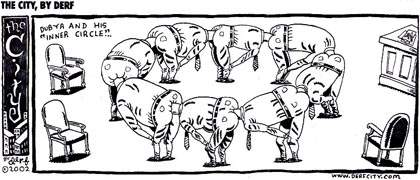
![]()
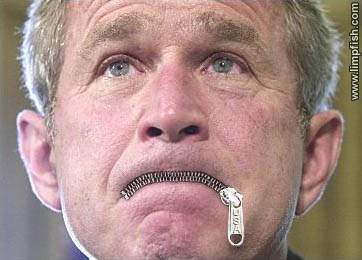
![]()
'TBH Politoons'
Thanks, again, Tim!
Reader Question
Re: 'McMillan & Wife'
What was the San Francisco 49ers jersey number that Susan St. James wore
in "McMillan and Wife" and why did she pick that number to wear??
Any help would be greatly appreciated!
~~ SRJ
Good question, S. Don't know off the top of my head, maybe someone else knows, but I remember 'Sally' in her sleeping jersey..
In The Chaos Household
Last Night
Another unusually warm day. Took pictures of the kid in his summer gear for the Alaskan grandmother.
Santa Ana winds are really blowing, so the dust is up and the humidity is down. Puffy, the calico kitten was having problems with static electricity on the living room carpet today. Nights like this I wish I had the time to re-read Nathaniel West's 'Day of the Locust', or some vintage Raymond Chandler.
Tonight, Tuesday, CBS opens the evening with a fresh 'JAG', then a fresh 'The Guardian', and finaly, a fresh 'Judging Amy'.
Scheduled on a fresh Dave are Richard Gere and Chris Elliott.
Scheduled on a fresh Craiggers is Kenny Johnson.
NBC offers a fresh 'Just Shoot Me', a fresh 'In-Laws', a fresh 'Frasier', a fresh 'Hidden Hills', and then 'Dateline'.
On a RERUN Jay are Al Gore, 75-year-married couple Mr. & Mrs. Wright, and Faith Hill.
On a RERUNConan are Greg Kinnear, Billy Connolly, and Mike Lupica.
On a RERUN Carson Daly (from 11/26/02), are Julie Bowen and Ben Kweller.
Jay, Conan & Carson Daly - all reruns, all week.
ABC has a fresh '8 Simple Rules', then a fresh 'Jim', a fresh 'Bonnie', a fresh 'Less Than Perfect', and a fresh 'NYPD Blue'.
The WB has a 2-hour RERUN 'Smallville'.
Faux offers a fresh 'That 70's Show', then a RERUN 'That 70's Show', and then a fresh '24' (Day 2: 4:00 - 5:00pm).
UPN has a fresh 'Buffy', then a fresh 'Girlfriends', and a fresh 'Abby'.
Fresh 'The Shield' on FX.
Fresh 'Osbournes' on MTV.
Anyone have any opinions?
Or reviews?
(See below for addresses)
A hot-air balloon shaped as a cathedral is prepared for its first flight in St.Gallen, Switzerland, on Monday, Jan. 6, 2003. The balloon has a height of 75 meters and an
length of 103 meters and is was designed by Swiss Jan Kaeser and Martin Zimmermann to celebrate the 200-year-jubilee of Swiss canton St.Gallen.
Photo by Regina Kuehne
Woo Hoo --- Look Who's Back!!
Moose & Squirrel
Guesting On 'Smallville'
Christopher Reeve
Christopher Reeve, the now- paralyzed actor who soared to movie fame as Superman, will soon lend some guidance to a young Clark Kent in an upcoming episode of the WB television series "Smallville."
WB spokesman Paul McGuire on Monday confirmed a report by TV Guide that Reeve will guest star in February as a brilliant scientist who provides Clark with "revelatory insight into his superhero destiny."
The episode with Reeve is slated to run during the key ratings "sweep" in late February, McGuire said.
According to the report in TV Guide's next edition, which hits newsstands next Monday, the Vancouver-based production will be shot in New York City to accommodate Reeve, who was paralyzed from the
neck down in a 1995 horseback riding accident.
As part of the deal for him to guest star on "Smallville," the WB will run a public service announcement at the end of the episode for the Christopher Reeve Paralysis Foundation.
Christopher Reeve
First Academy Awards of the Year
Scientific & Technical Oscars
The Oscar organization announced the first Academy Awards of the year Monday, honoring scientific and technical advancements in filmmaking.
An Oscar statuette will be presented to the company Alias/Wavefront for developing the "Maya" 3-D animation software.
Two other Oscar statuettes will be presented to Arnold & Richter Cine Technik and Panavision, Inc., for the two companies' continuing advancements in camera systems.
The Scientific and Technical Academy Awards will be presented at a gala black tie dinner on March 1, about three weeks before the main Oscar ceremony.
Other honors set to be presented will be plaques for four Scientific and Engineering Awards and six certificates for Technical Achievement Awards.
The sci-tech Academy Awards are based upon recommendations from the scientific and technical committee of the Academy of Motion Picture Arts & Sciences.
Scientific & Technical Oscars
Gondoliers, dressed as 'Good Witches,' are shown in front of Rialto bridge, for a regatta to celebrate the Epiphany in Venice, Italy, Monday, Jan. 6, 2003. In Italy, according to an old legend,
the Good Witch carry candies and presents to the children.
Photo by Francesco Proietti
To Receive Star On Hollywood Walk of Fame
Steven Spielberg
Steven Spielberg has been chosen to receive the first star of 2003 on the Hollywood Walk of Fame, the Hollywood Chamber of Commerce announced Monday.
The star honoring the director of "Jaws," "Raiders of the Lost Ark" and "E.T. The Extra-Terrestrial" will be dedicated Friday morning outside the Kodak Theater, the home of
the Academy Awards telecast, according to Walk of Fame chairman Johnny Grant.
This is the first time Spielberg has made himself available for a star, he added.
"We're just pleased that we finally got him," Grant said. "He could have been approved 20 years ago."
Steven Spielberg
Memorabilia on Display
Beatles
Harry Benson was in the room when the Beatles found out they would be playing on "The Ed Sullivan Show."
He photographed the Fab Four joking around, composing classics and flying to America.
Along with 80 of the photojournalist's works of the dynamic group, the Albany Institute of History and Art has also collected memorabilia from local fans for its exhibit, "The Beatles: Now and Then."
Benson was working at a newspaper in Scotland in 1964 when his editor sent him to Paris to cover the Beatles. He followed them around, taking pictures as they "played
tourist" — Paul McCartney and George Harrison looking at postcards of the Eiffel Tower, John Lennon mimicking a bust of Napoleon.
The night they found out they were going to the United States, Lennon banged McCartney in the head with a pillow, and the others followed, in what Benson labeled "the
pillow fight" photos. These are his favorites, he said in a recent interview.
The Beatles aren't the only stars in the images. A grinning Ed Sullivan in a "mop-top" wig warms up the audience before his show, and Muhammad Ali (then known
as Cassius Clay) hams it up with the lads in other photographs.
The exhibit runs through March 2.
Beatles
www.albanyinstitute.org
Hollywood Lines Up Against
Joe Lieberman
Like it or not, Hollywood is betting that Sen. Joseph Lieberman (D-Conn.) will make violent entertainment and music a campaign issue when announcing his bid for the presidency sometime this week.
Lieberman has long criticized showbiz for peddling smut to America's kids. He made sure to bring up the issue when running as Al Gore's running mate in the 2000 presidential contest.
Many Democrats in Hollywood have said they won't support Lieberman, and that his attacks are nothing short of an attack on the First Amendment. Rather, they will throw their support to another Dem,
such as Sen. John Edwards (D-N.C.) or Rep. Richard Gephardt (D-Mo.), who beat out Lieberman in announcing their candidacies late last week.
Joe Lieberman
In The Kitchen With BartCop & Friends
CNN Shakes Up Ranks
Correspondents
At least six correspondents are leaving CNN as the news channel continues to shake up its programming and personnel to compete with front-runner Fox News Channel.
Among the most familiar faces, Garrick Utley has decided against remaining with the network, CNN spokeswoman Christa Robinson said Monday.
Bruce Morton is also reportedly considering leaving the network, although CNN has not asked him to leave, Robinson added. Morton, whose contract ends later this month, said he has not made a decision.
The contracts of five others were not renewed at the end of 2002, Robinson said. They are Brooks Jackson, Allan Dodds Frank, Mark Potter, Bruce Francis and James Hattori.
There also was uncertainty about the future of business anchor Willow Bay after CNN canceled her two weekend programs, "Pinnacle" and "Business Unusual."
Correspondents
Dance music legends the Village People and the Disco Divas pose with 'Family Feud' host Richard Karn, third from left, during a break in the taping of the show's Disco
Fever episodes, Sunday, Jan. 5, 2002, in Burbank, Calif. The episodes will air the week of February 17th.
Photo by Danny Feld
Problem With Names
'Celebrity Mole'
Stephen Baldwin must have left a real good impression on Kathy Griffin. The flame-haired comedian spent several weeks with Baldwin during the taping of "Celebrity Mole," but never learned his name.
During an episode of "Entertainment Tonight," Griffin repeatedly referred to her game-mate as "Billy Baldwin." The producers of the entertainment show, instead of retaping the segment, just put a
sign on the bottom of the screen, noting Griffin meant to say Stephen Baldwin instead.
'Celebrity Mole'
Eyes Closer Ties with Disney's ABC
![]()
BBC
The British Broadcasting Corp. will look to strengthen its news-gathering relationship with Disney's ABC if stalled talks between the U.S.-based broadcaster and CNN do not resume, a source close to the BBC said on Monday.
"If the talks with CNN broke down, the BBC would be interested," said the source, who asked for anonymity.
ABC news already shares offices with the BBC in some countries, and the networks air each other's reports, but they operate independently.
ABC has relationships with other non-U.S. broadcasters, such as Japan's NHK and Germany's ARD.
BBC
Engagement News
Moore & Freundlich
Actress Julianne Moore plans to marry the father of her two children, filmmaker Bart Freundlich, her publicist said Monday.
The star of "Boogie Nights" and the 1998 "Psycho" remake became engaged over the holidays, but no other details were released by her spokesman, Steven Huvane.
The redheaded actress has been married twice before. She and Freundlich have a 5-year-old son and a daughter born last April.
oore & Freundlich
Formerly 'The Vidiot'
Stabbed Filming Stunt
Cameraman
A cameraman working on a new British reality TV show produced by pop superstar Madonna's husband, was stabbed while filming a stunt designed to trap would-be car thieves.
The cameraman was working on a new series called "Swag," produced by Guy Ritchie which uses hidden cameras to film people being tempted into illegal acts, British broadcaster Channel Five said Monday.
The incident, which came to light Monday, happened before Christmas when an expensive car was left unlocked in a run-down area of London.
A thief, who had just broken into the car, stabbed the cameraman in the leg with a screwdriver after he spotted him filming the scene from across the street. The person was apprehended and will appear in court next week.
Cameraman
Visitors to a Buddhist temple in Bangkok feed bananas to turtles in the temple's pond, January 7, 2003. The temple, Wat Posop, has become a refuge for thousands of turtles which have been released
by Buddhists as a means of doing good deeds for their karma.
Photo by Sukree Sukplang
6 More Episodes
![]()
'Makeover'
ABC's primetime schedule seems poised for an "Extreme Makeover."
Nothing's official yet, but the network is in negotiations to order about six additional episodes of the before-and-after hour in which civilians are radically reconstructed, often via plastic surgery.
Industry buzz has the format launching as a weekly series in March or April, perhaps on Thursday nights. But in fact, ABC executives haven't yet formally decided whether to use "Makeover" as
a series or a series of specials, network insiders said.
'Makeover'
New Suit Hits Hollywood
'Clean Video'
The legal battle over sanitized versions of Hollywood movies has heated up with a software supplier announcing it will file a countersuit against leading filmmakers, the Directors Guild of America and the major Hollywood studios.
ClearPlay, which sells software that excises sex and foul language from videos and DVDs, is claiming in the action that the DGA, directors and studios have overstated their rights under copyright laws. The Utah-based
company, which plans to file the claim Monday in federal court in Denver, also claims its software doesn't create altered versions of movies and that studios don't have the right to control all aspects of how consumers view movies.
The filing adds to the growing legal tangle created by a preemptive suit filed in August by retailer CleanFlicks against the DGA and 16 leading directors. CleanFlicks filed the suit in order to obtain a ruling
that its practice of altering films is legal.
The studios have alleged copyright and trademark infringement against ClearPlay, CleanFlicks and 13 other businesses that traffic in sanitized versions of films with sex, foul language
and violence chopped out. That action seeks a permanent injunction but does not ask for any monetary damages, asserting that the "irreparable" injury cannot be adequately calculated or compensated.
'Clean Video'
For Cars
Satellite TV
Satellite communications company KVH Industries Inc. hopes to put an end to back-seat bickering among grumpy siblings during long family car trips.
The Middletown, Rhode Island-based company will introduce a satellite TV antenna that transmits movies, sports and news programming to sport utility vehicles (SUV), minivans,
and luxury automobiles equipped with backseat entertainment systems.
Drivers throughout the continental United States can get more than 300 channels of DirecTV satellite TV movies, news, sports and live broadcast entertainment, as well as 50
channels of commercial-free radio. In the future, the antenna system will provide high-speed Internet access. DirecTV is a unit of Hughes Electronics Corp.
KVH's system will be marketed to current DirecTV subscribers, and sold through consumer electronics retailers. The antenna system will cost roughly $2,000 to $2,500, and
the satellite programming will be less than $10 a month.
Satellite TV
Hungry swans on the river Thames at Windsor, England, forage for food, Monday Jan. 6, 2003. The big freeze which hit Britain caused wide-spread travel chaos as cars
froze and floods hit railway services across the country. Forecasters predict snow falls and temperatures falling to minus 10 degrees celsius (14 degrees fahrenheit) overnight.
Photo by Dave Caulkin
'The Osbournes'
'The Osbournes' ~ Page 4
'The Osbournes' ~ Page 3
'The Osbournes' ~ Page 2
'The Osbournes' ~ Page 1
Free Rolling Stones Concert In LA
Stop Global Warming
